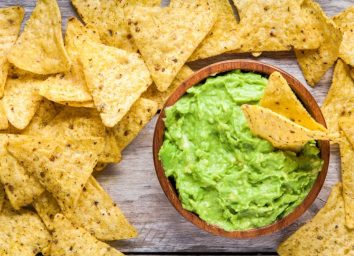17 Probiotic Pairings That Double Your Weight Loss
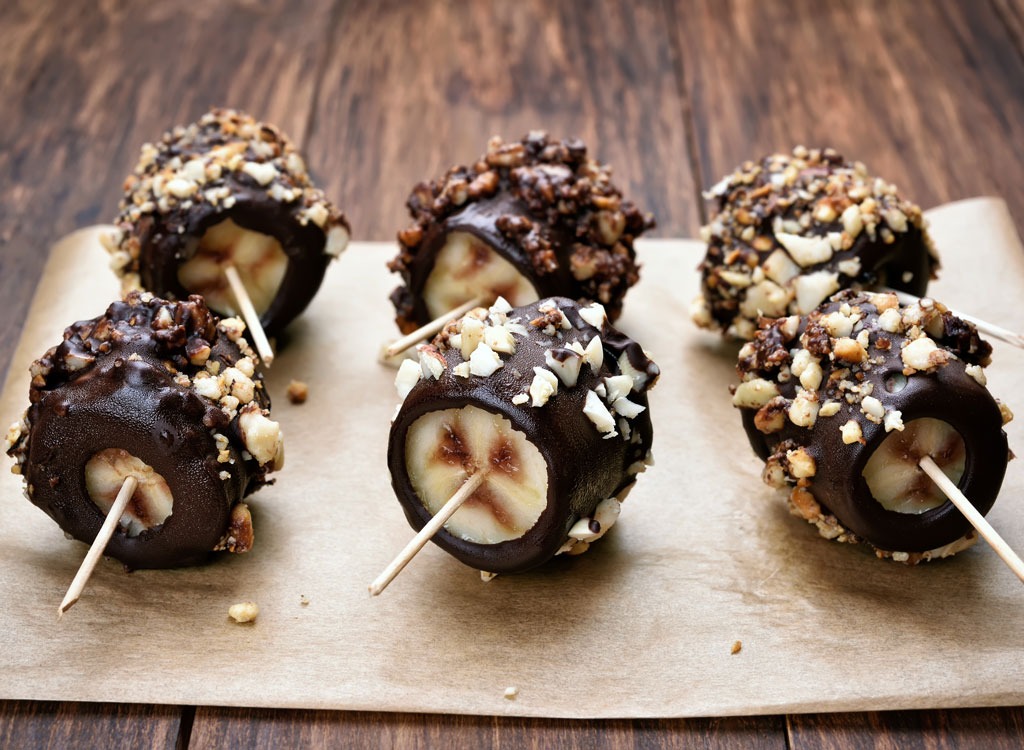
Peanut butter and jelly, apples and peanut butter, cookies and milk—there are lots of foods that taste better when eaten in pairs. But better taste isn't the only benefit of pairing up your snack picks. It turns out, combining certain foods can also make the partnership more effective at promoting weight loss. For example: the magical combo of probiotics and prebiotics.
Together, prebiotics and probiotics work in a symbiotic relationship to improve gut health, which a Nature Reviews Endocrinology analysis concluded can ultimately help you lose weight by decreasing food intake, belly fat, and inflammation.
So, what are the best ways to pair these two elements in terms of nutrients and taste? Here are our favorite suggestions. And for more gut-healthy foods, check out our list of best probiotic foods for a healthy gut.
First… A Brief Lesson on 'Biotics
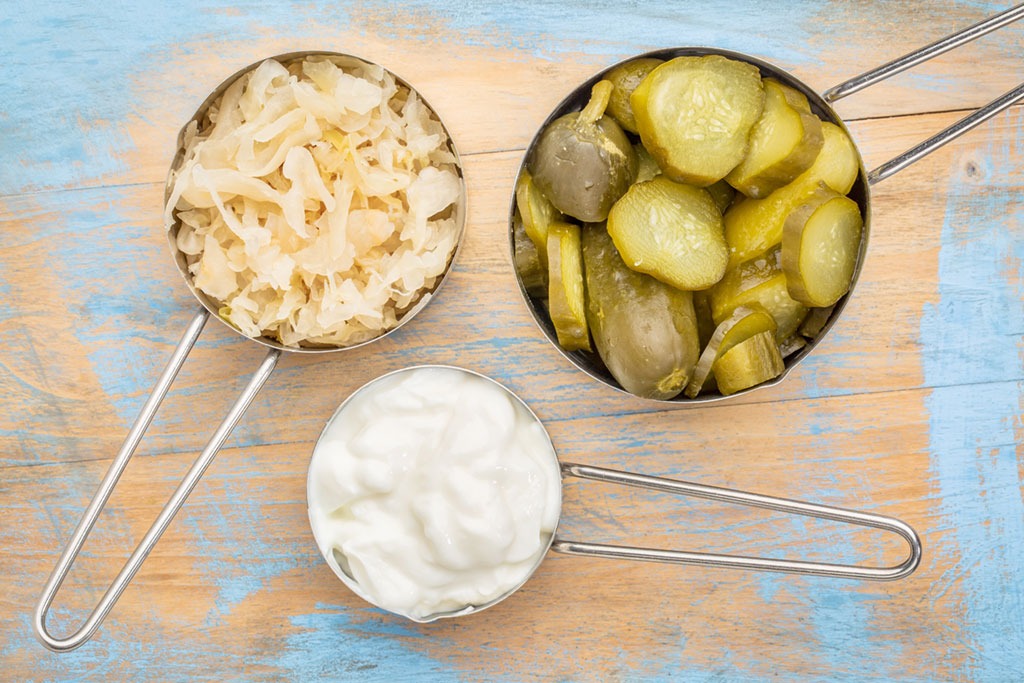
What Are Probiotics?
There's a battle going on in your belly and your body isn't able to fight it off alone. That's why we call in probiotics for backup. You've likely heard of these immune-boosting, inflammation-fighting, metabolism-revving good guys before. Probiotics are live bacterial cultures that are found in fermented foods like Greek yogurt and kombucha.
They get the name "pro" because they promote better gut health by helping to alleviate IBS symptoms, boost your immune system, and fend off bad bacteria strains that can rev appetite and cause weight gain. But even these nutritional superstars can occasionally use a boost. That's where prebiotics come in.
What Are Prebiotics?
Prebiotics are the key to making sure those probiotics can provide you with their stellar benefits. Unlike probiotics, prebiotics don't contain any bacteria themselves; rather, they act as the food source that helps the probiotics, as well as the good bacteria already in your gut, grow and thrive.
Prebiotics are a type of carbohydrate known as soluble fiber, which a Nutrients journal review described as a compound "known to resist digestion in the human small intestine and reach the colon where they are fermented by the gut microflora," and can go on to help improve the composition and activity of gut bacteria.
How do probiotics and prebiotics promote weight loss?
This gut-friendly duo teams up to improve your weight loss results because they support each other. Probiotics need prebiotics to work their inflammation-reducing magic. Not only have scientists connected probiotics and prebiotics to weight loss independently, but the fact that probiotics feed on prebiotics make these combos all the move effective for weight loss.
Dark Chocolate and Bananas
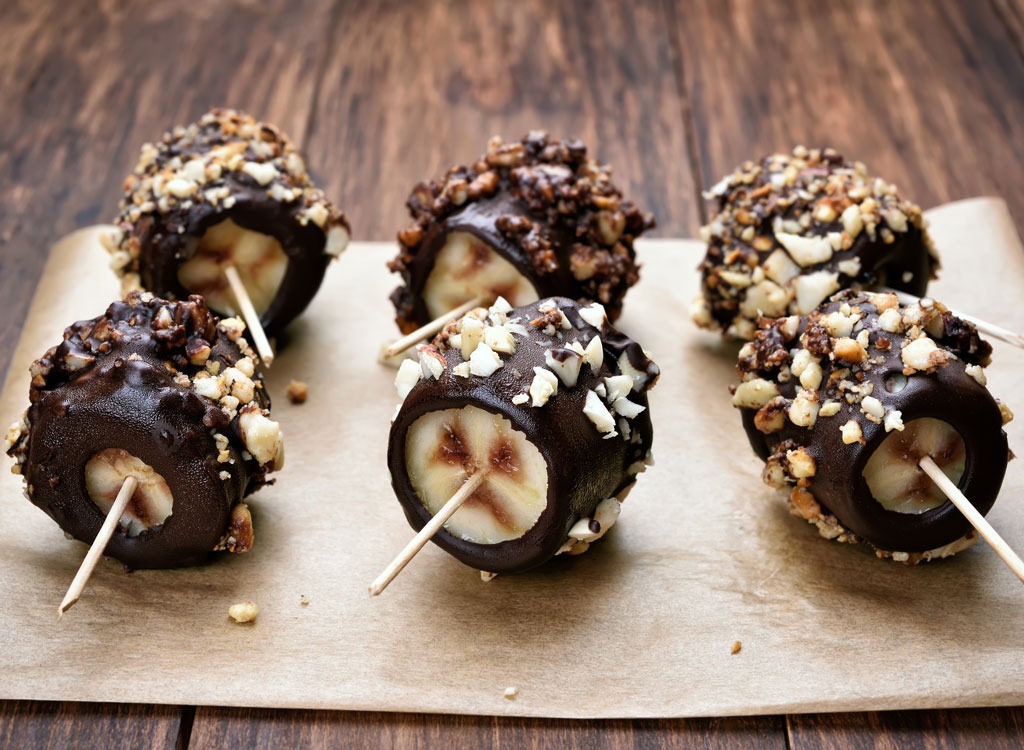
The Probiotic: Dark Chocolate
The Prebiotic: Banana
Bananas are one of our favorite foods for weight loss. They're loaded with potassium, which will accelerate hydration and muscle recovery, and the substantial dose of prebiotics helps ease digestion as well. Add that to probiotic-rich dark chocolate, and you've got yourself an epic duo. That's because we're not the only ones who love chocolate—our gut bugs do, too! A study conducted at Louisiana State University found that gut microbes in our bellies ferment the sweet stuff into heart-healthy, anti-inflammatory compounds that put a block on genes associated with insulin resistance and inflammation. We recommend freezing banana bites covered in melted dark chocolate for the perfect portion-controlled dessert.
Eat This! Tip:
Be sure to grab a dark chocolate bar with 70 percent cocoa solids or higher. Lower percentages of cocoa means more sugar. And because high sugar diets promote the spread of bad belly bacteria, you could end up offsetting the benefits of this mighty microbiotic team.
Berry Smoothie

The Probiotic: Greek Yogurt
The Prebiotic: Berries
Smoothies can help you achieve your flat belly goals, but the benefits of a berry and Greek yogurt smoothie go beyond just zipping up your skinny jeans. That's because Greek yogurt is filled with two strains of bacteria (the good kind): Streptococcus thermophilus and Lactobacillus bulgaricus. Mixing that up with wild blueberries not only pumps up your fiber count, but also builds up your prebiotic count. The antioxidant-rich berry was proven to improve the balance of gut microbiota (in rats) in just six weeks according to a study published in the journal PLoS ONE.
Eat This! Tip:
If you really want to rev up this smoothie, add in flax seeds for another probiotic and bananas as another prebiotic. Not into drinking your breakfast? Combine these ingredients into a tasty parfait for the same immune-boosting benefits.
Antipasti Plate
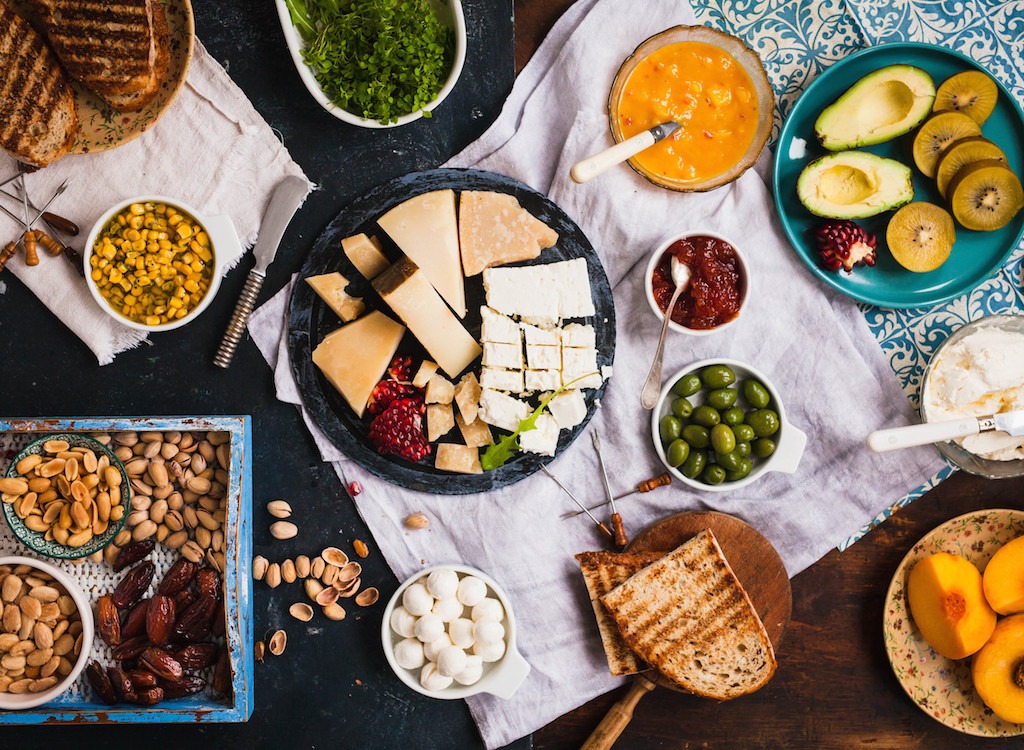
The Probiotic: Green olives, soft age cheese, flax crackers
The Prebiotic: Roasted asparagus, garlic roasted veggies, gigante beans
Next time you're hosting a get-together, set out an antipasti plate that's good for your gut. Be sure to include green olives, soft aged cheeses such brie and feta, garlic roasted broccoli and asparagus. Asparagus is packed with prebiotic fiber, and garlic is filled with antimicrobial properties, which is key for balancing your levels of good and bad gut bacteria. A study published in the journal Phytomedicine showed that garlic hurt the bad bacteria, Clostridium, but left the good guys, Lactobacilli.
Cottage Cheese and Crackers
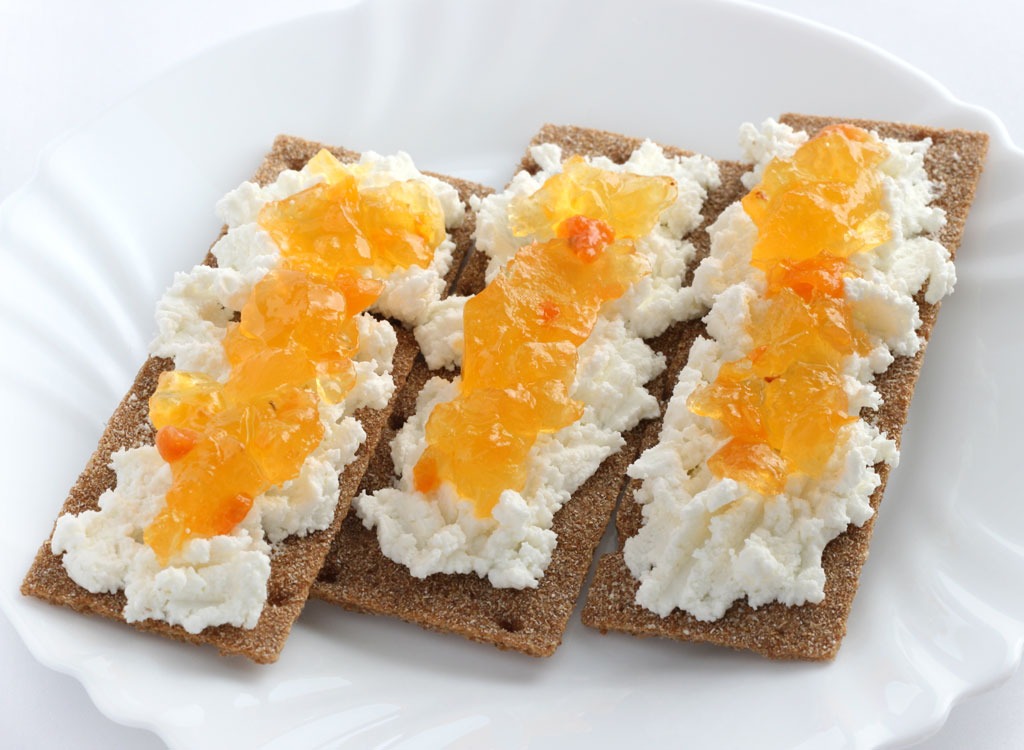
The Probiotic: Cottage cheese
The Prebiotic: Flax seed crackers
Reaching for the cottage cheese is a great way to cut back unwanted calories and fat compared to a typical cheesy spread. But not all cottage cheese is as great for your gut as its competitors. One company, Good Culture, adds probiotic strains to its products, making it a gut-friendly option. Mixing that with a flax-based cracker like Mary's is one of our favorite healthy snack ideas. These crispy wafers are rich in prebiotic soluble fibers, which helps repair the gut as well as feed your microbes. And if you're looking for more of a meal, eat up some cottage cheese with blueberries for breakfast!
Miso Soup
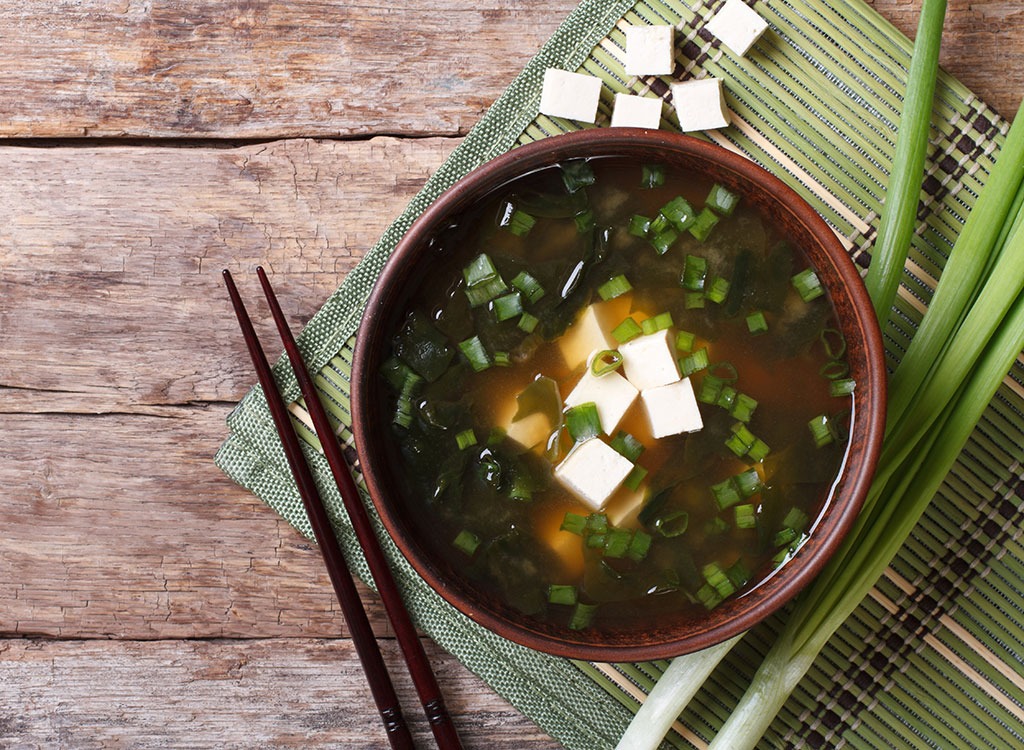
The Probiotic: Miso
The Prebiotic: Scallions
A go-to appetizer just got even better! That's because the starter soup is made with miso, a soybean product that's fermented with salt and koji—a probiotic fungus called Aspergillus oryzae. This good-for-the-gut miso is also a complete protein—meaning it contains 9 essential, muscle-building amino acids. Combine that with some prebiotic green onions or scallions, rich in inulin, which the gut uses to clean house as well as enhance a number of good bacteria in our gut.
Miracle Noodles with Green Peas and Cheese
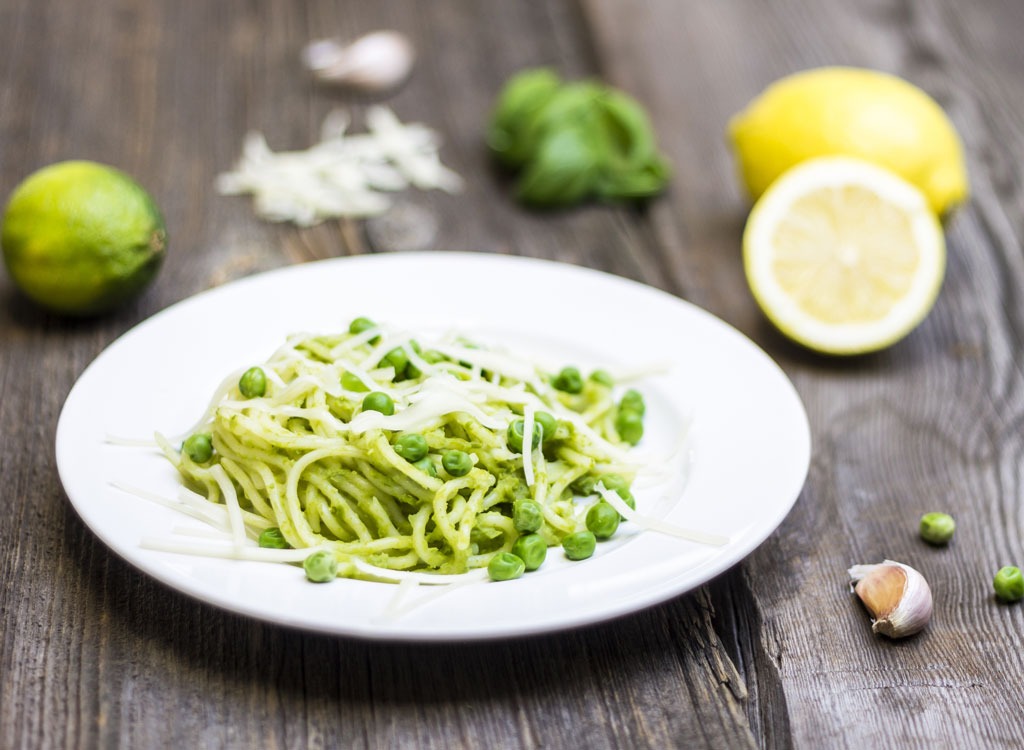
The Probiotic: Green peas, goat cheese
The Prebiotic: Konjac- Miracle Noodle Base
Miracle Noodles, also known as Skinny Noodles, are made out of konjac: a prebiotic and dieter's BFF. These noodles are a mere 20 calories per serving and are a great alternative for those trying to lose 10 pounds without feeling deprived. The downside: The noodles are practically taste-free. But they will soak up your dressing of choice. Opt for probiotic green peas, which are rich in strains of Leuconostoc mesenteroides. A Journal of Agricultural Food Chemistry study found that this strain stimulates your immune system: your first line of defense against bad bugs and toxins. And mix in a soft cheese created by fermentation, like goat cheese, filled with beneficial bacteria leading only to a delicious, guilt-free super.
Kombucha and Oatmeal
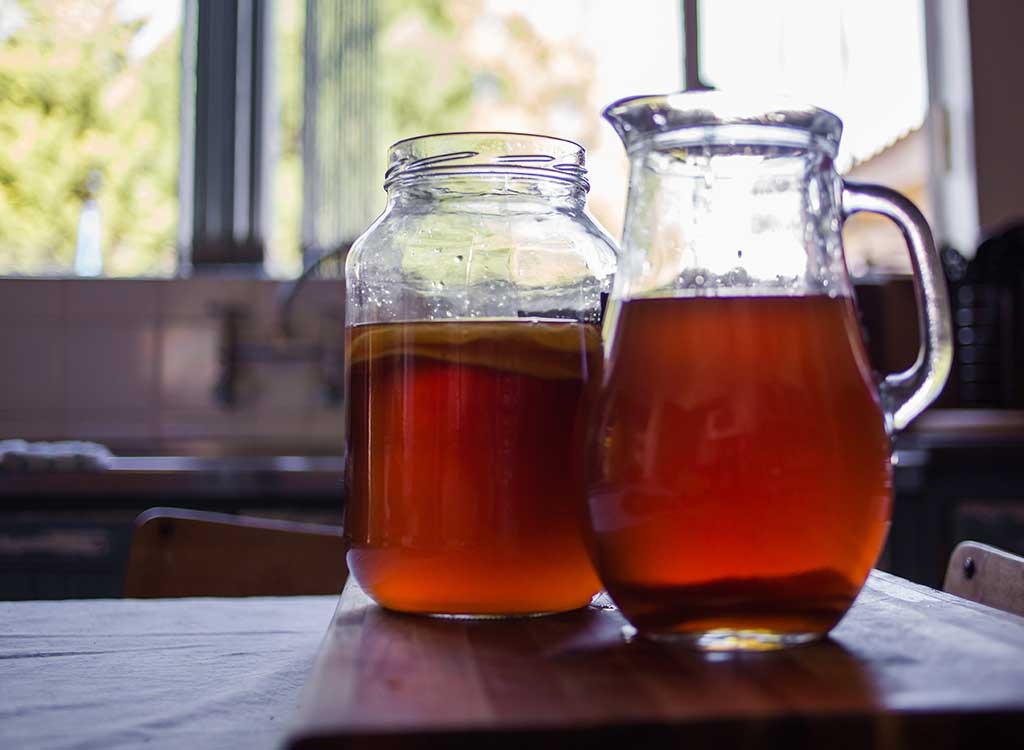
The Probiotic: Kombucha
The Prebiotic: Oats
If breakfast is the most important meal of the day, why not make it the absolute best it can be? Ditch your coffee and give kombucha a shot. This probiotic bubbly drink has been found to contain the same strains of bacteria and yeast that yogurt and kefir commonly carry. Researchers have found that the drink increases the rate at which our bodies reduce levels of cortisol—a hormone that causes fat storages and weight gain, so sipping it can keep you slim. That, along with the addition of whole-grain oats for breakfast, is sure to keep you full and focused throughout the morning. Oats are a great source of an indigestible soluble fiber known as beta-glucans. These fibers help feed probiotics and have been connected to lowering levels of bad cholesterol, and putting a halt on an inflammatory action happening inside.
Jicama and Yogurt Dip
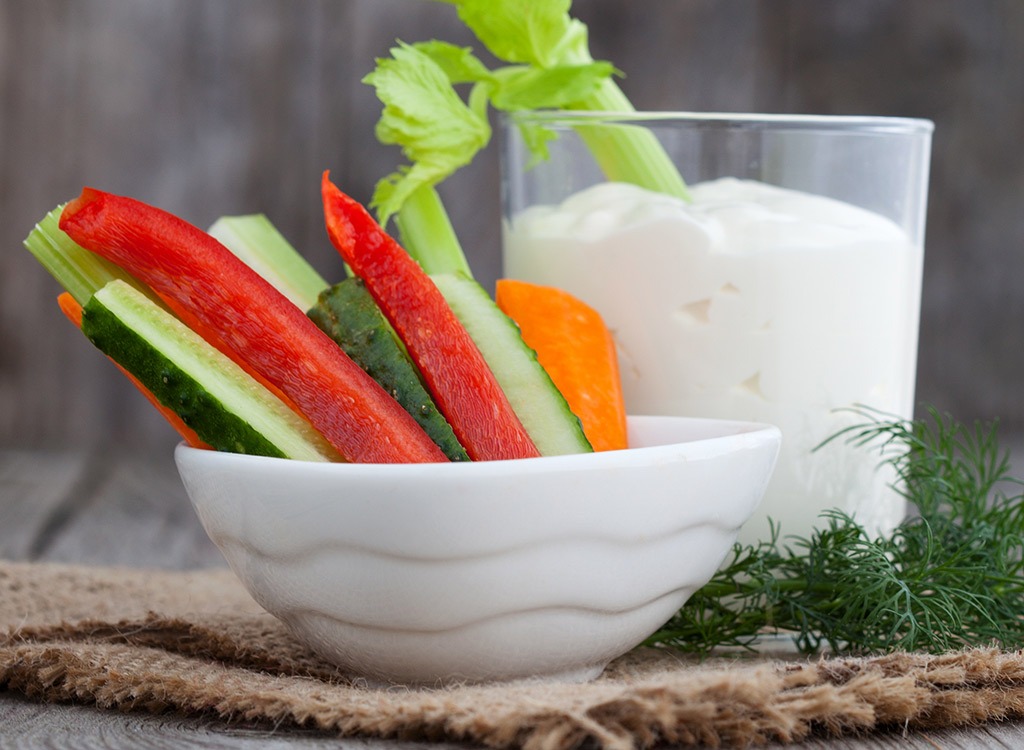
The Probiotic: Greek Yogurt
The Prebiotic: Jicama
Who said dip had to be guilt-filled? Make ranch or Tzatziki with Greek yogurt, and then use vegetables such as carrots, celery, and jicama—for your prebiotic fix—to eat your creamy dip.
Beef and Barley Soup
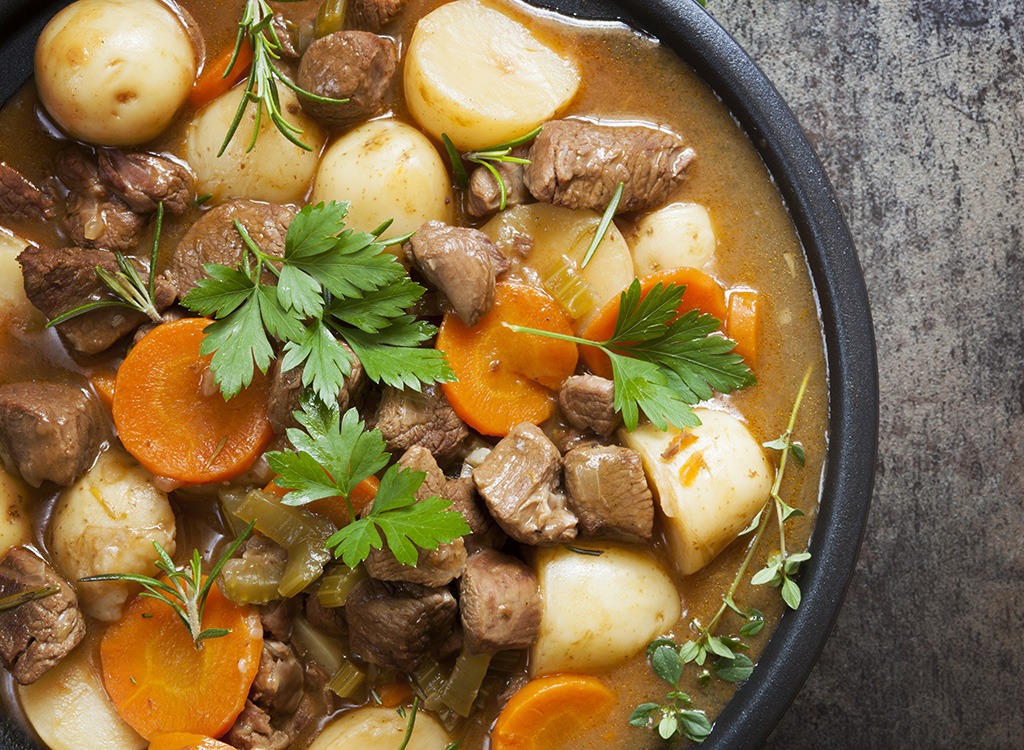
The Probiotic: Peas
The Prebiotic: Barley
A classic winter dish that just happens to be good for your gut! Barley is a great additive to soups because it is a whole grain. Studies have shown that once paired with a probiotic, like the addition of peas to this soup, a cup of whole grains a day can increase levels of Bifidobacteria and Lactobacilli after just 3 short weeks.
Apple and Brie Panini
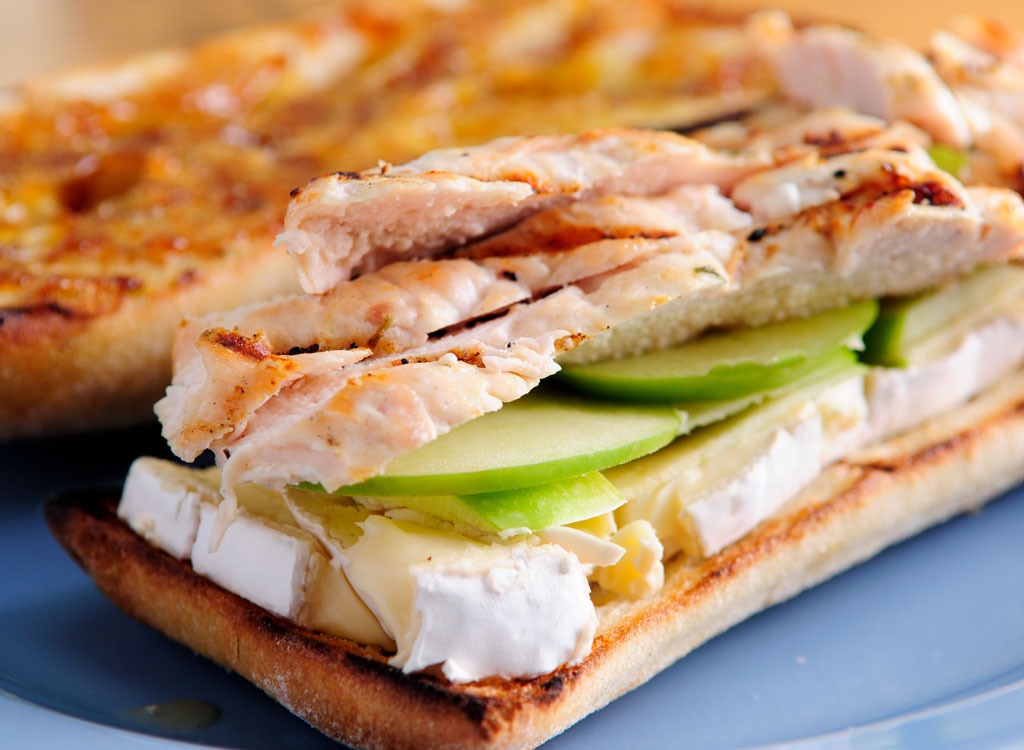
The Probiotic: Sourdough bread, brie
The Prebiotic: Apples
An irresistible sandwich just got so much better. Gooey brie cheese, crisp apples, and freshly-baked sourdough are pressed to perfection. Apples are a prebiotic, but only if you leave the skin on! That's because the prebiotic fiber, known as pectic, is only found in the peel. Turns out your teachers were right: An apple a day keeps the doctor away!
Cheese and Bean Quesadilla
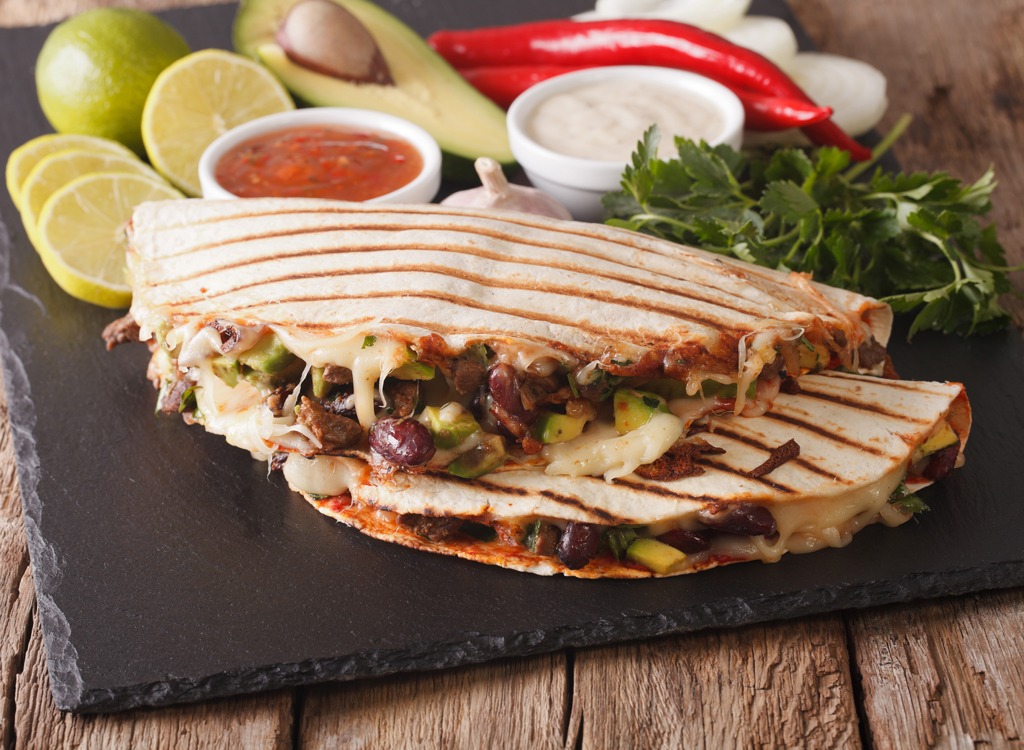
The Probiotic: Cheddar cheese
The Prebiotic: beans
If you're going to indulge in a quesadilla, make sure your grab some gut-friendly benefits at the same time! Including a soft cheese, like cheddar, will help you reap probiotic benefits, particularly if you give it a kick with the addition of beans, a fiber-filled prebiotic. Some beans are better than others; we recommend navy beans, white beans, and black beans. Together this combo not only fills you with protein and fiber, but it also help to boost your metabolism and clear your gut.
Lentil Soup with Sourdough Bread
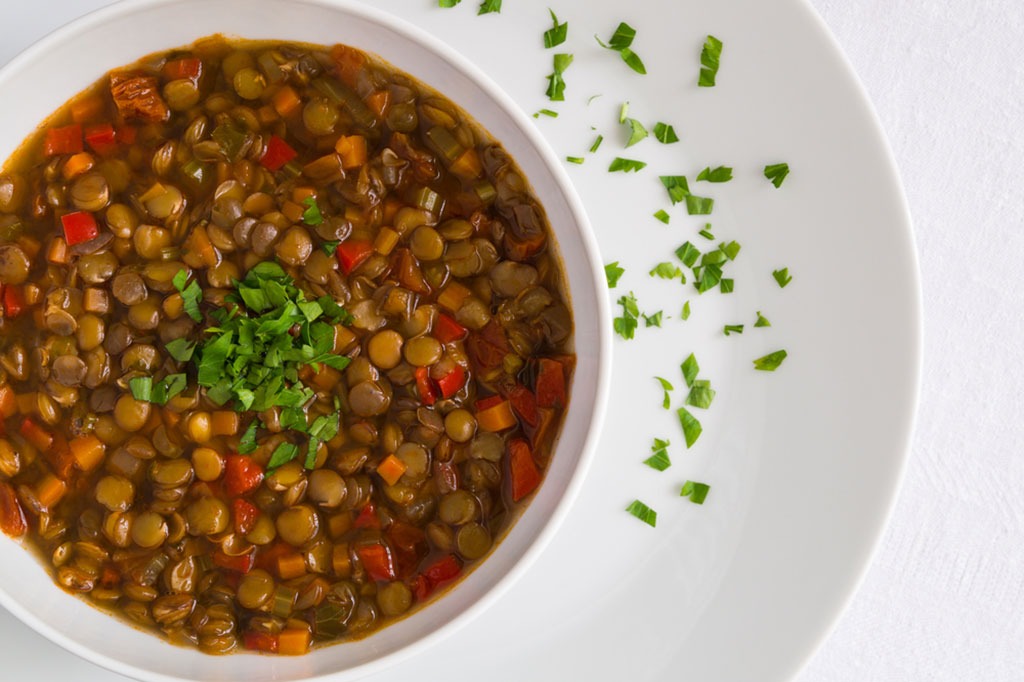
The Probiotic: Sourdough bread
The Prebiotic: lentils
What better way to eat your lentil soup than with a piece of freshly baked sourdough bread? When sourdough is bubbling away in the rising process, fermented wild yeast and friendly bacteria break down the gluten and sugar, creating good-for-your-gut proteins. Mixing that with lentils, a resistant starch, that allows microbes to ferment into fatty acids helps turns off genes that lead to inflammation and insulin resistant.
Whole Grain Granola with Greek Yogurt
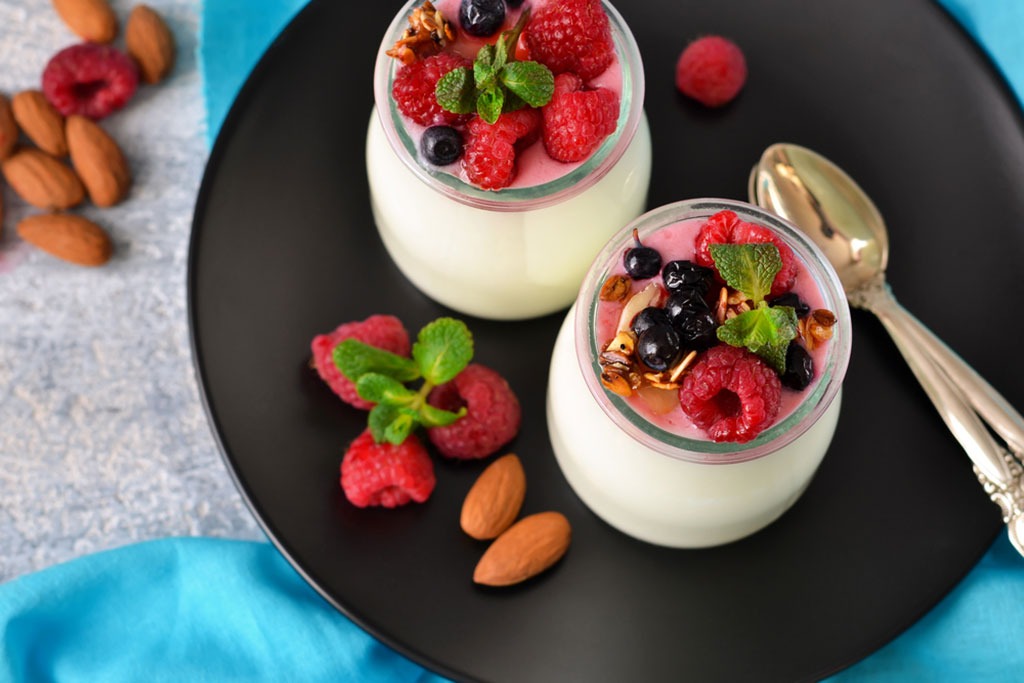
The Probiotic: Greek Yogurt
The Prebiotic: Whole Grain Wheat
We can't find a better way to start your morning, than with Greek yogurt. But topping it off with high fiber foods, like cereal made out of whole-grain wheat is an even better way to go. The less processed it is, the easier it will travel down to your gut to feed your beneficial microbes Swapping whole grain cereal for refined and processed granola is one of the easiest ways to fit prebiotics into your diet.
Kimchi Quinoa Bowl
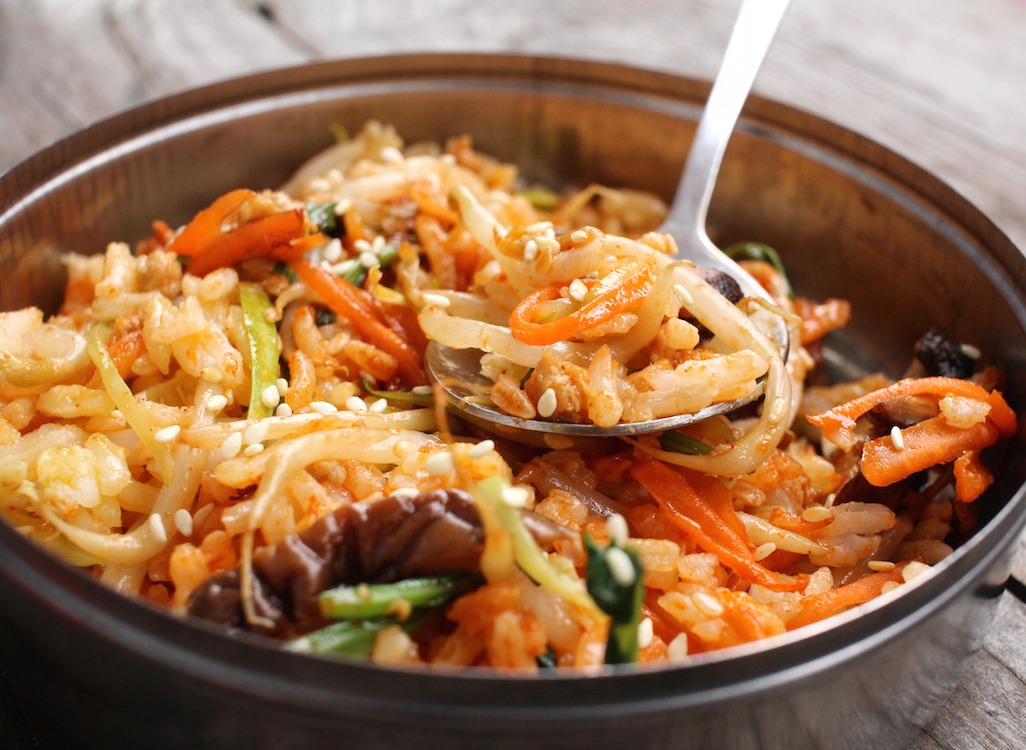
The Probiotic: Kimchi
The Prebiotic: Asparagus, spinach
Kimchi may be a foreign concept to you. That's okay, but it's worth investigating. This Asian fermented veggie dish is made out of cabbage, radishes, and scallions. Pairing the probiotic with green veggies and olives in a Buddha bowl will do more than just heal your gut. In fact, researchers at Kyung Hee University in Korea found that after consistent consumption of Lactobacillus brevis, the cultured strain found in kimchi, obese lab rats experienced suppressed weight-gain by 28 percent! Meaning, compared to the other weight gaining weight, the rats consuming this strain gained less.
Greek Salad
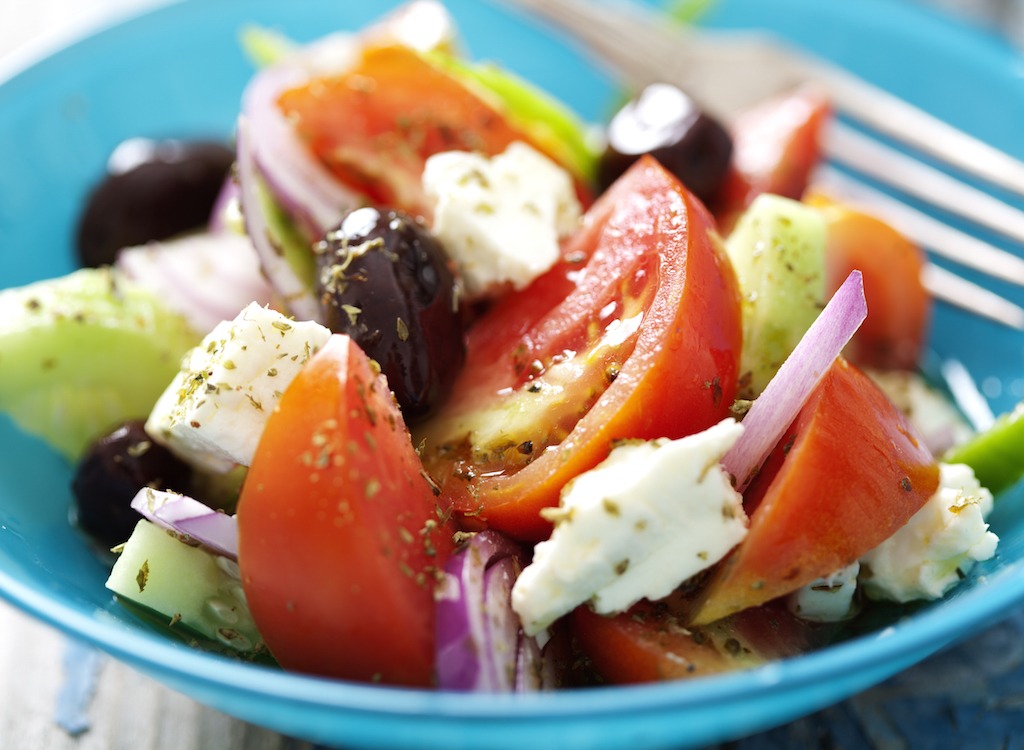
The Probiotic: Tempeh, feta, olives
The Prebiotic: Onions, chickpeas
This classic light salad has the perfect crunch, salt, and protein without overdoing it. But beyond that is so much more. Like the beans mentioned before, chickpeas are a great source of prebiotics because they too, are "resistant starches." An experiment published in the Journal of Functional Foods explains that when you consume a resistant starch, your gut biomes gets stronger. Translation: when you incorporate these into your diet the beneficial bacteria from fermented tempeh, your gut get a physical workout during the digestive process, becoming more assertive and leading to a healthier gut.
Kefir Smoothie
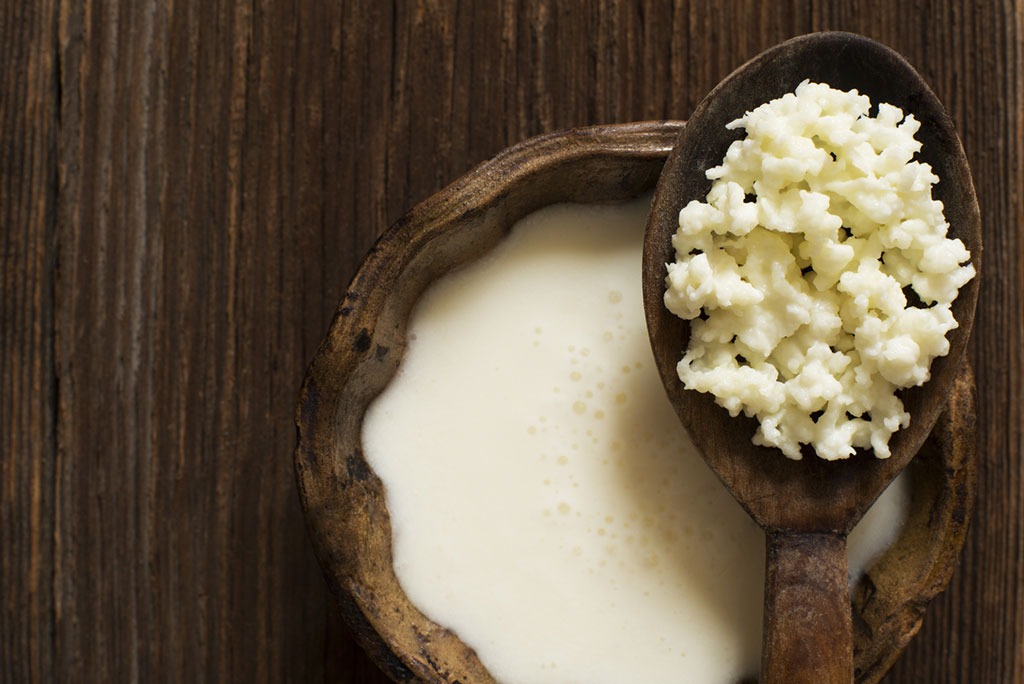
The Probiotic: Kefir
The Prebiotic: Blueberries, Flax Seeds
If you have a dairy-intolerance, kefir might be worth a look. This smoothie-like drink has been found to counteract the unwanted effects of milk's tummy troubling lactose. In an experiment conducted at Ohio State University, researchers found that drinking kefir can reduce gas and stop belly bloat typically brought on by lactose consumption up to 70 percent! Pair that with some blueberries and flax seeds and you're set to heal your gut.
Tempeh Taco Salad
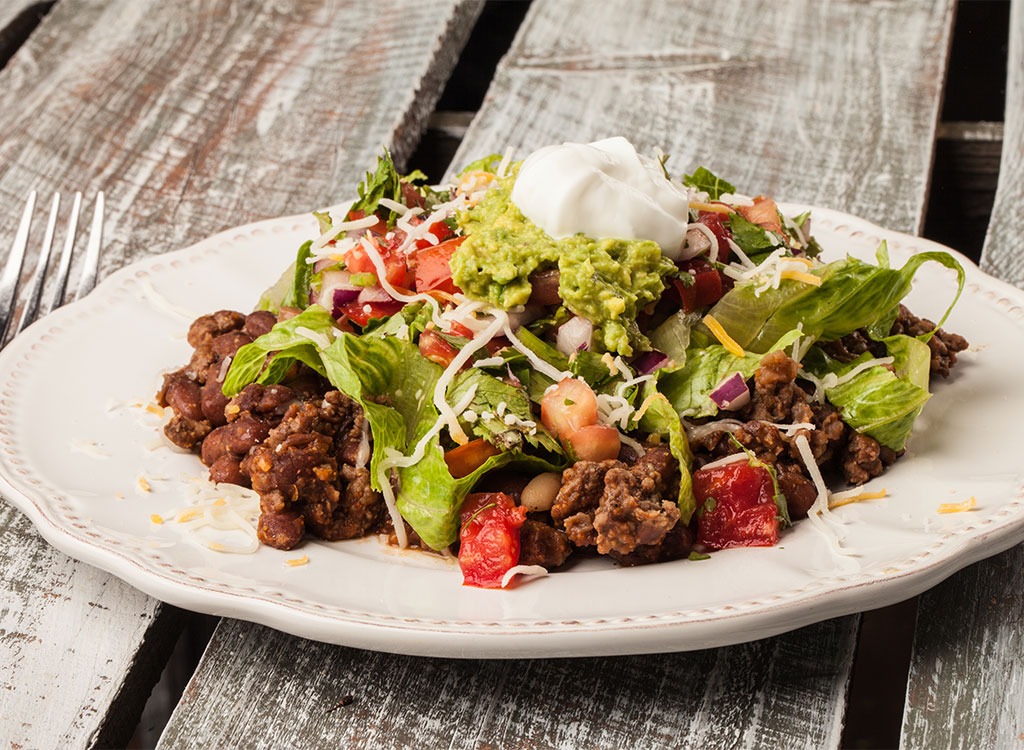
The Probiotic: Tempeh, cheddar cheese
The Prebiotic: Beans, onions
Tempeh is one of the most well-known vegan foods out there, and trust us, the no-meat eaters are onto something good. This fermented soy product is made with a yeast starter that has a tender bite and little to no flavor. So when it's paired with taco seasoning, rich raw cheddar, deliciously seasoned beans and onions, it creates one heck of a great-for-your gut meal.
